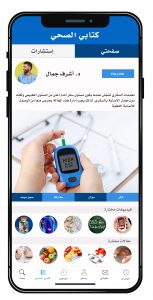As an Endocrinologist, Dr. Antoine explains how more than a third of his patients come in having already diagnosed themselves, and only in need of a confirmation and an official prescription. He wonders how many others browse the internet, self diagnose, and do not visit a specialist, and how often misdiagnosis causes serious repercussions. The age of information has virtually placed all knowledge known to mankind at the palms of hands of all people, and with so much information comes misinformation. Collaborative healthcare is a care philosophy that aims to empower patients by providing them with the tools necessary to be well informed of their condition and actively involved in their healthcare experience.

Why?
Collaborative healthcare is not an option healthcare providers can choose whether to adopt or not anymore. It is an emerging paradigm through which patients gain more control over decisions and actions affecting their health. It is a two-way engagement that does not mean disempowering heatlhcare providers, but on the contrary, it is only possible through regular medical feedback and it significantly enhances treatment outcomes.
Collaborative healthcare increases trust and builds a partnership between patients and healthcare providers. It increases the patients’ responsibility for their own health while improving compliance. Moreover, collaborative healthcare creates a transparent, informative, and satisfactory healthcare experience that helps patients live better, healthier, and healthcare providers retain their satisfied patients.
How?
The tools necessary to achieve a patient-doctor collaborative relationship must achieve two things:
– Patients acquiring enough knowledge on a regular basis to engage their healthcare providers.
– A facilitating environemnet/platform.
trakMD, as a patient engagement platform highly active in Lebanon, has adopted the collaborative healthcare philosphy in empowering patients by providing both patients and healthcare providers with a multitude of smart and automated tools to build participatory partnerships.
For that purpose, trakMD worked closely with healthcare providers and patients, utilizing their feedback to optimize its patient engagement tools. As a result, a patient’s healthcare experience on trakMD is now more comprehensive and empowering than ever. In addition to the convenience of finding and booking doctor appointments 24/7 and receiving automated appointment reminders, patients are equipped with three other tools dedicated to empowering them:
Personal Health Records
Upon creating an account on trakMD, users get a digital personal health record (PHR) which they can enrich with their health history, vaccinations, measurements, and examination results as attachments. Patients assume complete ownership of their PHR, and have the luxury of choosing whether, while booking appointments, healthcare providers can have access to their PHR or not. Access can even be specified as either “view only” or “view & edit”, and with the latter, healthcare providers may update information available in the PHR. Sharing the PHR with healthcare providers helps improve medical outcomes by providing a much needed health history that would prove to be much more trustworthy than in-visit inquiries.
Preventive Reminders
Recommendations for cyclical checkups and examinations are rarely adhered, and the main reason is failure to track when an. trakMD delivers the cyclical reminders module that helps automate the process and personalize it for every patient indefinitely. Predefined templates are selected for patients once, and will keep recurring unless assigned otherwise. By providing patients with the knowledge and assistance to make decisions that can improve their health, they are empowered by their own healthcare providers in a perfect example of how a patient-doctor partnership can be satisfactory for both.
Patient Education
trakMD’s patient education module is the basic building block of a patient-doctor collaborative healthcare experience. By assigning patients to different groups based on their health conditions or other criteria, healthcare providers share knoweldge personalized to the patients’ needs. It is a process that doesn’t and shouldn’t stop, and aims to make patients co-responsible and actively engaged in their healthcare experience.
The nature of collaborations between healthcare providers and patients differs from a specialty to another. The way psychologists in Lebanon would engage their patients is completely different to how a dentist would. Dermatologists, for a example, may assign cyclical reminders relevant to their specialty and share different educational material with different patient groups( ‘fillers’ group, ‘botox’ group, ‘skin diseases’ group).
 When trakMD was launched, it was never about an online appointment booking platform that patients can find and book doctors with, albeit a much needed tool for better accessibility to healthcare professionals. The two seasoned experts in the healthcare industry had, in fact, set their sights on building a comprehensive platform that serves as the go-to solution for everything healthcare, be it for patients or healthcare providers.
When trakMD was launched, it was never about an online appointment booking platform that patients can find and book doctors with, albeit a much needed tool for better accessibility to healthcare professionals. The two seasoned experts in the healthcare industry had, in fact, set their sights on building a comprehensive platform that serves as the go-to solution for everything healthcare, be it for patients or healthcare providers.